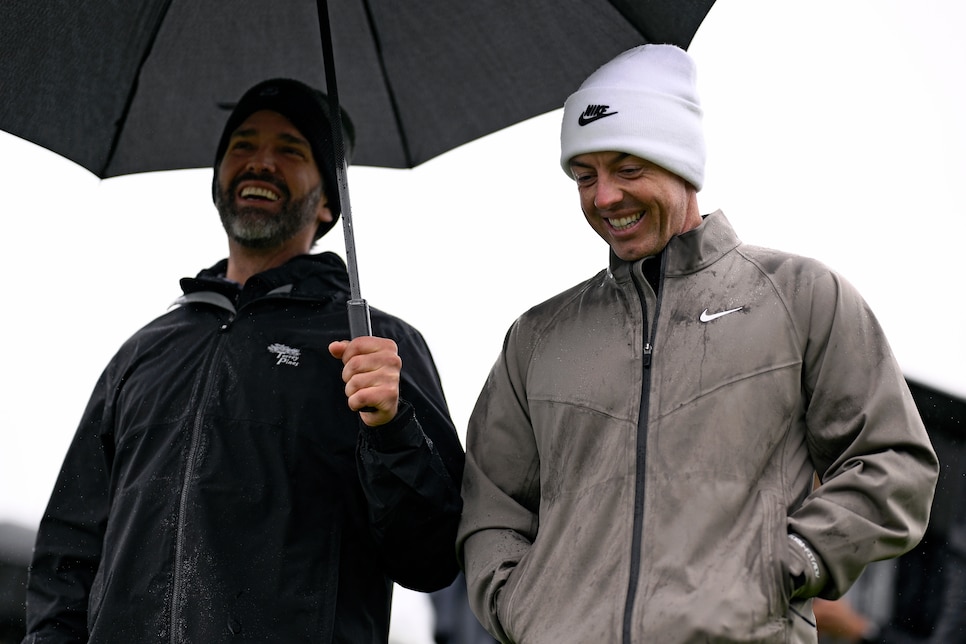There is a freedom that comes with surrender, releasing the weight of a battle whose outcome lies beyond your control. This shift was palpable in Rory McIlroy’s demeanour during an intimate, impromptu gathering on Wednesday (US time) at Torrey Pines, sheltered in the tournament scoring room from the rain that had wrapped San Diego in its grey embrace. As has been the case throughout his career, questions about professional golf’s future came in waves, and McIlroy met them with his characteristic blend of introspection, vulnerability and charm. But his words weren’t carefully measured to represent his tour or champion golf’s greater good. Instead, for the first time in a long time, McIlroy was speaking with the unburdened voice of a man who had given himself permission to be just Rory.
Over the past four years, McIlroy has been golf’s most prominent voice, speaking with candour about both his own game and the sport’s tumultuous evolution. At every tournament, microphones turned his way not just because reporters asked, but because he was willing to answer when others remained silent. In the vacuum of decisive leadership during the golf’s existential crisis, McIlroy stepped forward as an unlikely statesman. His commitment never wavered, even after the shocking June 6, 2023, framework agreement betrayed the very values he had defended. By shouldering this burden of leadership, he risked not just his public persona but his performance on the course, a pressure that revealed character as he navigated the challenges of both.

In recent months, however, whispers have circulated through tour corridors: Rory has reached his breaking point. His Wednesday conversation wasn’t just candid; it was a quiet manifesto of exhaustion, a subtle but unmistakable signal that golf’s most tireless defender had finally laid down his shield.
“No, I don’t know,” McIlroy said after playing his nine holes in the Genesis Invitational Pro-Am, in regard to a question about what the tour has done with its $US1.5 billion equity investment. “I’m not part of it anymore.”
McIlroy maintains an official connection to the PGA Tour’s Saudi negotiations through his role on the three-player “transaction subcommittee” – a position that feels like a consolation prize after several players blocked his attempted return to the policy board last year. But the reality runs deeper. McIlroy’s team has made it clear, to anyone willing to listen behind the scenes, that he’s emotionally divested from the process, no longer willing to pledge loyalty to an institution that failed to match his commitment. Now, when Rory speaks, his words carry a different meaning. Gone are the calibrated statements meant to serve a purpose or position. In their place are the unfiltered thoughts of a man who has chosen to prioritise his own truth and his family’s well-being over the burden of being golf’s moral compass.
His latest comments created stark contrasts with his past positions, a shift that would have been unthinkable even months ago. The contradictions hung in the air, laid bare without apology:
On why a deal hasn’t been done, which in the past McIlroy has preached for patience given all the moving parts: “From my viewpoint, no, I don’t think it’s complicated at all.”
On bringing LIV players back after he previously asserted they should serve some sort of punishment: “There are guys that were on the PGA Tour that went to play on LIV, and if they still have status, sure, come back, come back and play. Like for us, they’ve all got equity in this tour. Having Bryson DeChambeau come back and play on this tour is good.”
On Donald Trump, who McIlroy had asserted he regretted playing with in a 2020 interview and that he wouldn’t play with him again: “Yeah, I played golf with [Trump] a few weeks ago… It was great. Yeah, it was really good, it was really good. I thought we had a good discussion. I learnt that he’s not a fan of the LIV format. I was like, ‘But you’ve hosted their events.’ He was like, ‘Yeah, but it doesn’t mean that I like it.’ So I think he’s on the [PGA] Tour’s side.” (McIlroy played with Trump’s granddaughter during Wednesday’s pro-am and was seen talking with Donald Trump Jnr during their round.)
On his changing stance against PIF, which he originally criticised because of what they stood for and what they were doing for the game: “Because I look at what I made in 2019 before LIV came around and I look at what I’ve made after LIV came around and it’s very different. Like, I don’t know what to say, I earn more money now than I did in 2019 and if LIV hadn’t have come around, I don’t know if I would have been able to say that.”
Critics who deride McIlroy for his shifting positions reveal their own shallow understanding of growth. In a sports world calcified by pride, the willingness to evolve his thinking stands, at times, as commendable. Each position he takes – whether it aligns with past statements or contradicts them – represents an honest reckoning with the truth as he sees it in that moment.
Yet the whiplash between his responses to recurring questions does demand acknowledgment. This crackled to life on Wednesday when a reporter, voicing what many had privately wondered, confronted McIlroy about his reversal on PIF.
“I didn’t feel that way initially because of the fracture… it wasn’t good for the game, it wasn’t good for the overall game,” McIlroy explained. “It wasn’t good for either tour, I didn’t think. I think we’re both sort of like this has been great for the major championships. We all get together at the major championships and that’s been a really good thing, but for both tours it’s unsustainable… I was opposed to a lot of it. I was opposed to 54 holes, I was opposed to the team concept in some way, but when you sort of remove yourself from it a little bit and you look at the overall picture, like we’ve all done better because of this.
“The players on the PGA Tour had more leverage than they ever had to go to the tour to say we want this, we want that or whatever. But at the same time I regret some of those decisions too because it put the tour in a place where they were stretched financially and they sort of had to look at taking money from elsewhere to try to compete.
“But like it’s all easy in hindsight to say these things, but I think we are closer to getting a resolution and hopefully we can all just move forward.”
Though his words addressed the deal, they revealed something more personal. No player has paid a steeper price in golf’s civil war than McIlroy – the reluctant soldier who sacrificed pieces of himself for what he thought was right. The weight of diplomacy, of words and actions, has left scars. Now he yearns to shed that mantle and reclaim what made him extraordinary: the unique talent who can make the impossible look effortless, who can set galleries alight with a single swing. The past few years have done a number on him, grinding down the pure joy of the game beneath the millstone of politics and responsibility. In this moment of surrender, Rory McIlroy isn’t seeking redemption or validation. He is simply reclaiming himself.











